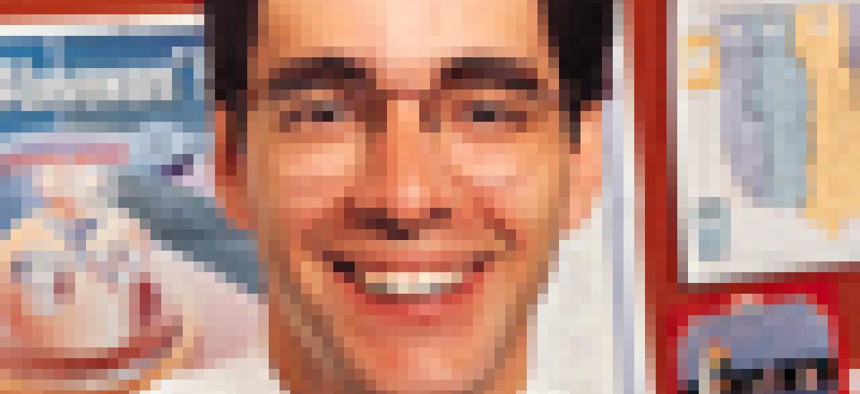MARKET SHARE

Information technology giant Electronic Data Systems Corp. surprised investors when it warned that second quarter revenue for 2000 will fall below analystsÕ expectations. That news sent the stock down 35 percent in three days to a new 52-week low, and the company lost almost $10 billion in market value.
By Bill LoomisInformation technology giant Electronic Data Systems Corp. surprised investors when it warned that second quarter revenue for 2000 will fall below analysts' expectations. That news sent the stock down 35 percent in three days to a new 52-week low, and the company lost almost $10 billion in market value. EDS now expects its base revenue non-General Motors business to grow in the low single digits vs. the 10 percent growth analysts were looking for earlier. The company blamed its sales force reorganization, and potentially a slowing economy, for the slower revenue growth. EDS continues to back consensus earnings-per-share estimates, citing expanding profit margins. In its first quarter, most traditional IT service firms we track reported less than expected revenue, from the largest companies in the industry, such as IBM Global Services (10 percent global market share in IT services), EDS (5 percent) and Computer Sciences Corp. (3 percent), to smaller companies, such as American Management Systems Inc. and Keane Inc.Strong performance from CSC's federal government unit boosted results. We attributed the shortfall in its first quarter of 2000 to the year 2000 lockdown, as we have for results from the second half of 1999. With most Y2K lockdowns ending by the end of February, business has ticked up in March and April, though May generally has not continued the acceleration. Companies involved in larger outsourcing or application outsourcing contracts indicate that negotiations are taking longer than expected, but should ramp up in the next quarter or so. E-business remains very strong among traditional IT companies, with most indicating strong sequential growth, though e-business remains less than 25 percent of revenue for most traditional IT companies.Enterprise resource planning and non-Web-related custom software development also seem to be soft, though picking up. Enterprise application integration is strong, with integrators tying ERP and package software systems together and to e-business systems. In government IT, there also has been a slowdown in revenue growth at CACI International Inc. and Advanced Communication Systems Inc. (before its acquisition by Titan). AMS and Maximus Inc. also have experienced a slowdown in revenue from state and local governments over the past quarter.So why might IT spending not be picking up as quickly as predicted? There seems to be no clear answer, and, in fact, many companies still believe they are on target to meet expectations. But no one we speak with is talking about better-than-expected results in traditional IT, unlike in the e-business solutions space. Could traditional IT spending be disappearing in favor of e-business IT spending? Certainly, e-business spending is outpacing traditional IT spending by a wide margin, but it still remains a relatively small part of the overall market.Total IT spending in 2000, government and commercial, is estimated by International Data Corp. at $350 billion worldwide and growing at about 10 percent per year. E-business services spending in 2000 is about $27 billion and growing at 44 percent per year, even faster over the next one to two years. If we add up the first quarter 2000 annual run rate revenues for 30 publicly traded commercial e-business solutions companies, the total was $5.4 billion (including $1.4 billion from marchFirst Inc., much of which on the Whittman-Hart side of that company may not be true e-business). The total billable employees were 23,000 (including 7,000 from marchFirst). This compares with EDS' first quarter run rate revenue of $18.1 billion and well over 100,000 employees. Even AMS had $1.2 billion in run rate revenue and more than 9,000 employees.E-business is the fastest-growing segment in traditional IT, but it won't replace completely traditional IT spending. The latter spending is picking up, though many companies still are taking a breather following Y2K, before initiating large new projects, such as ERP implementation or large custom software development. Eventually the mainframe systems upon which billions were spent remediating will be replaced, probably with robust packaged software solutions and Web-based systems. Although the pickup in traditional IT spending is slower than expected, it will accelerate in the second half of the year.

Bill Loomis is managing director of the Technology Research Group at Legg Mason Wood Walker Inc. in Baltimore. He can be reached at wrloomis@leggmason.com. Legg Mason makes a market in American Management Systems and CACI International. Within the last three years Legg Mason has managed or co-managed a public offering of Maximus Inc. Electronic Data Systems is a Legg Mason Select List Core Holding. This information is based on sources believed to be reliable but is not guaranteed as to completeness or accuracy.

Bill Loomis
Bill Loomis is managing director of the Technology Research Group at Legg Mason Wood Walker Inc. in Baltimore. He can be reached at wrloomis@leggmason.com. Legg Mason makes a market in American Management Systems and CACI International. Within the last three years Legg Mason has managed or co-managed a public offering of Maximus Inc. Electronic Data Systems is a Legg Mason Select List Core Holding. This information is based on sources believed to be reliable but is not guaranteed as to completeness or accuracy.
NEXT STORY: Maryland Steps Ahead On E-Procurement